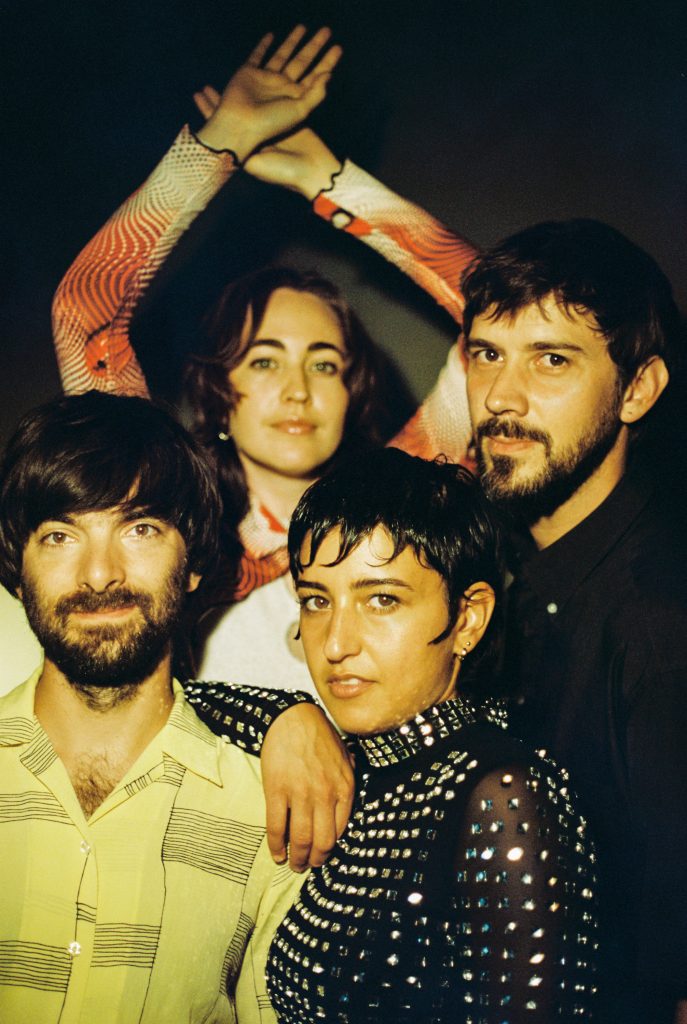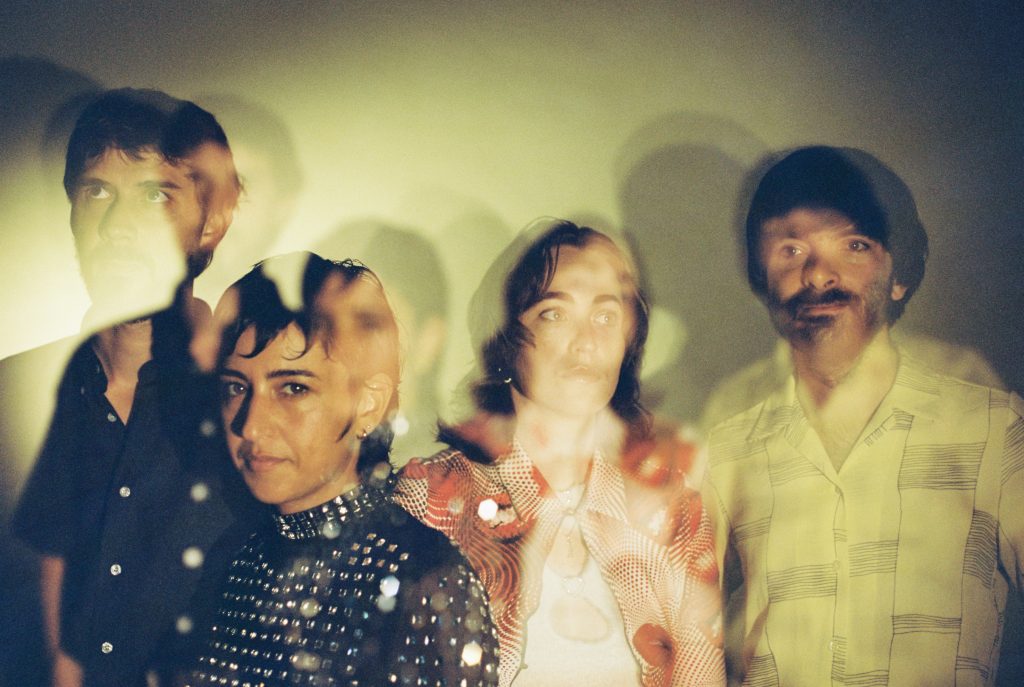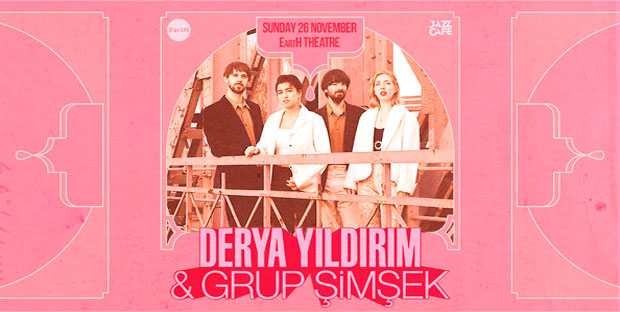Derya Yıldırım and Grup Şimşek are a firm favourite on the indie music circuit with their infectious Anatolian psych-pop groove that’s heavily influenced by the likes of Selda Bağcan, Aşık Mahzuni Şerif, and Barış Manço.
Music anthropologist, DJ and friend Sebastian “Booty” Carrell (B-music) introduced lead singer and bağlama player Derya Yıldırım to Graham Mushnik (organ and synths) and Antonin Voyant (guitar, bass and flute), who are members of France-based collective Catapulte Records, during a festival in New Hamburg.
The trio jammed together and ended up performing what was initially a one-off live show. Thankfully for us, when the Hamburg project came to an end, they decided the band must live on!
Grup Şimşek gathered again in 2015 in London followed by France. Two years later, they released their first EP, Nem Kaldı, on Catapulte and Bongo Joe — four superb tracks which made an instant impact.
Several tours and a hatful of records later, including their brilliant 2022 8-track album Dost 2, and Derya Yıldırım and Grup Şimşek have a growing international fan base that loves their contemporary reinterpretations of Turkish classics alongside their own compositions.
Drummer Helen Wells joined the band last year in May and the quartet are set to return to London to perform their largest UK concert yet at EartH in Hackney on Sunday, 26 November.
We caught up with the group ahead of their London gig to ask them about how a mainly non-Turkish set of musicians came to be recording music influenced by Anatolian folk and rock, and what to expect from their upcoming gig.
To the band members whose roots are not from Turkiye: how familiar were you with the artists and music of Turkiye before forming Grup Şimşek?
Helen: I would say I was only vaguely familiar with traditional Turkish sounds until I joined Grup Şimşek and, as far as specific artists and even different genres of Turkish music are concerned, I am still learning a lot through the band. Having recently moved from South Africa to Berlin, I definitely hear more Turkish music around me here.
Antonin : Graham and I had already been listening to some of the cult albums from the 60s/70s by Barış Manço, Selda Bağcan, Erkin Koray and the Altın Mikrofon compilations. But meeting Derya opened an endless field of discoveries, from classics to oddities. We also learned (and still are learning!) the evolution of Turkish music through time and the different folk music areas. This music culture is so huge you could spend a lifetime exploring it.
To Derya: when and how did you get into playing bağlama?
I actually grew up with Anatolian folk music, and bağlama plays a major role in there. My father used to play bağlama when I was little.
This music has its roots in ‘house’ music – basically, music played in the home – and it all started like that.
The biggest impact of learning music was actually beyond the sounds of the bağlama. I grew up learning many instruments and the coherences, differences and similarities within the classical European music and Anatolian folk, and Turkish classical music, shaped me into who I am now.
Your ethnic and national roots are all different. What made you want to focus on Anatolian music?
Derya: The whole Şimşek story – it was meant to be, I would say. Because we were all [jig-saw] puzzled together for a collective theatre festival in my hometown of Hamburg/Veddel in 2014.
It was very special and it felt really natural to create music together, so we just continued playing the sounds we like to listen to, and well of course Anatolian music plays a big role in this carpet of sounds, because I am playing an instrument which was born in Anatolia.
You’ve covered vintage songs by Turkish icons and folk heroes, including Selda Bağcan, Aşık Mahzuni Şerif, and Barış Manço, alongside your own compositions, managing to stay respectful to these traditional Turkish folk and Anadolu rock classics and melodies, while also creating music that is very contemporary. How easy was it to achieve that?
Derya: We basically always follow our instinct and at the same time we are aware of actually preserving music from the past; folk music. It’s also really necessary with who you work with, and that every bandmember speaks the same language even though we talk in different ways with our music.
We like to cover those songs, because we like the melodies and progressions and also the meanings of the lyrics, which are still quite contemporary and coherent with the topics of the century we live in.
Archiving our own compositions are more fun for me, in a way, because we start from scratch and shape our own thoughts together.
Antonin: I guess we’ve been pretty lucky to be on the same page from the start. Through our record label and our various bands, we had developed a sound which was matching the world of Derya’s bağlama and vocals. We also always had the same taste regarding what songs to cover. So, it was a natural process to mix the traditional side with our own sensitivities to create something new.
What’s been the most pleasing or notable moments of your experience as a band since forming in 2014?
Derya: I really like to think back to the very first moment we met with the band, and rehearsed in the basement of the church we used to perform for this theatre festival. It was the beginning of Şimşek, but we had no clue about what was going to happen afterwards. I like to think back, because it felt raw, naive and simple.
Antonin: I remember being emotional the first time I heard our version of Nem Kaldi on the radio. That’s when I truly realized this band had something special and that we should hang on to it!
What can we expect from your upcoming gig at EartH in London?
Derya: It will be a very special show I think, joining our old friends Malphino on stage. It’s always been amazing in London, it felt like coming back to a huge fan-base every year! Most of my music friends played in EartH, so I’m quite excited to experience the vibe there finally.
Antonin: As far as I remember all the Simsek shows in London have been really exciting. We lived 8 years in London. We have many friends there and people seem to really know the songs, singing along, dancing and going wild. It’s also really special to play on what used to be our High Street, and of course share the stage with our friends Malphino.
Derya Yıldırım and Grup Şimşek play EartH in East London on Sunday, 26 November 2023. Tickets are priced £20.66 per person. Click here for more information and tickets.





